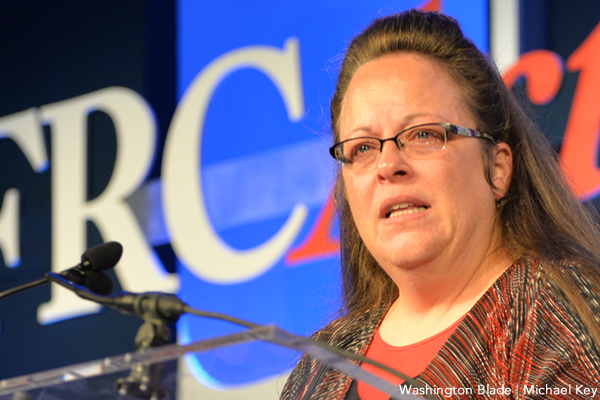News
Transphobic comment overshadows LGBT media gathering
New NLGJA President Sharif Durhams is ‘mortified’
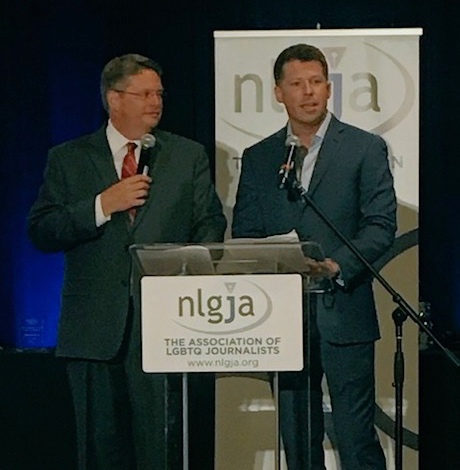
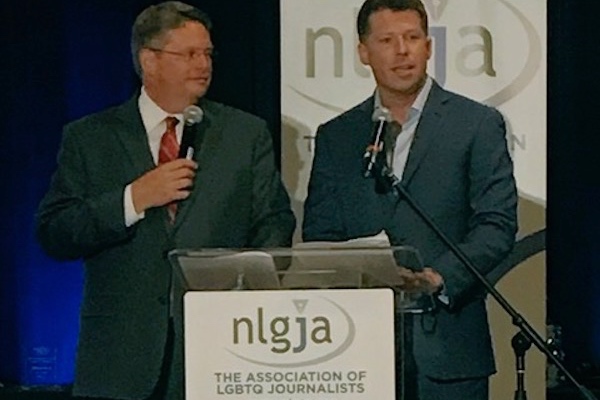
Marshall McPeek, meteorologist for WSYX-TV/WTTE-TV in Columbus, OH and Sean Lewis, anchor at WGN-TV in Chicago, in tweet photo posted by Mary Emily O’Hara.
Openly gay Columbus, Ohio meteorologist Marshall McPeek, a longtime member of NLGJA: The Association of LGBTQ Journalists, apparently skipped all the references to the importance of respecting transgender people in the NLGJA Stylebook and its recent supplement on terminology. In a crassly symbolic display of the murky chasm between a mission statement and practice, McPeek opened his remarks at NGLJA’s closing reception Sept. 8 in Palm Springs with “Ladies and gentlemen, things and its” in welcoming the audience.
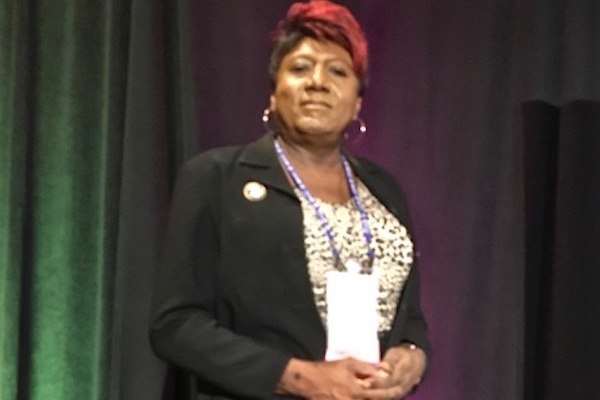
Monica Roberts (Photo by Karen Ocamb)
Black TransGriot blogger Monica Roberts yelled at the stage: “Oh no, he did not….There are no Things or Its here!” And though an immediate tweet by them reporter Mary Emily O’Hara on McPeek’s comment went viral.
Initial reaction was that apparently no one else in the room rose with a similar public condemnation. However, Jason Parsley, Executive Editor of South Florida Gay News, notes that not everyone was paying attention. “I was in the room,” he tells the LA Blade. “I did hear the emcee say “Ladies and Gentlemen” but I must have tuned out after that because I did not hear the “things and its” remark. Nor did I hear Monica scream out. I had no idea anything offensive was said until the emcee publicly apologized. At that point I asked several people around me what the hell was said. No one that I spoke with knew. I suspect there were others in that room that also missed those remarks. Later when I learned from a tweet what had been said I was obviously disgusted and appalled.”
McPeek subsequently apologized, as did NLGJA. “People were understandably hurt and offended by last night’s remarks. As journalists, we understand uniquely that words matter. We apologize and are committed to working to make NLGJA more inclusive and diverse,” NLGJA’s statement read.
“No Mr. McPeek and by extension, NLGJA and FOX News [an event sponsor], there were no ‘things and its’ in that Hotel Zoso room that September 8 night. There were trans, gender non-conforming (GNC) and non-binary (NB) people in there,” Roberts wrote. “How do you think that ‘things and its’ comment, which has been derisively and sometimes violently spat at the trans community by all transphobic comers over the last few years made us feel?”
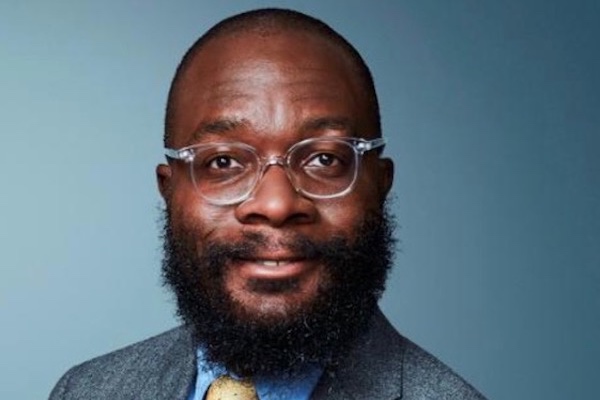
NLGJA President Sharif Durhams (photo courtesy CNN)
“When I heard about the comment, I was mortified,” incoming NLGJA’s first African American President Sharif Durhams (Senior Editor, CNN Digital) said in a statement to the Los Angeles Blade. “People have used slurs about my race and sexual orientation. There are comments that are painful and that you can’t take back. We’re supposed to provide a space that’s safe.
“We have and have had transgender and non-binary members on our board of directors, and we listen to them. Transgender and non-binary members pitch panels, and we ask them to lead those panels. Transgender and non-binary members weigh in when we change our stylebook and when we work with media organizations on fixing problematic coverage. We’re going to continue to do all of that,” he continued.
“I spent our entire conference talking with members and potential partners about programming I want to launch around coverage of transgender people. We’re going to do that, too,” Durhams said. “The whole point of this is to expand the circle of people who lead this organization. We’re going to ask more people to join us, and they will have a say in what we do next.”
Durhams also responded to questions about NLGJA receiving funding from Fox News. “Members of NLGJA and other LGBTQ journalists work there, and their employer is supporting them. We want to promote fair, accurate coverage of our community by all news organizations, so we’re working with as many as we can,” he said.
Fox News did not reply to a request for comment from NBC News/Out, which ran a report on the incident Sept. 10 — but Tony D’Angelo, general manager of Fox 28 and ABC 6, the two stations where McPeek works, condemned the comments “to the highest degree,” saying they were “hurtful and offensive.”
“Marshall’s comments in no way reflect the values of Sinclair Broadcast Group,” D’Angelo wrote in an email statement to NBC News. “We are an inclusive workplace that prides itself on all employees feeling comfortable and welcome. Sinclair has supported the important work of NLGJA and its member journalists and we were saddened by his comments.”
Also saddened by McPeek’s comments were many of the other participants at the NLGJA convention, as well as attendees at the 10th annual national convening of LGBT editors and bloggers put on by the Evelyn and Walter Haas Jr. Fund and the Arcus Foundation. This year #LGBTMedia2018 was organized in conjunction with NLGJA, coordinated by NLGJA Executive Director Adam Pawlus.
“We’re waiting for feedback from the convening’s attendees about the new format before deciding what to do next year,” Haas Jr. Senior Program Director Matt Foreman told the LA Blade.
Unfortunately, McPeek’s offensive transphobic comment overshadowed what was otherwise a very interesting and productive four days of networking, education and professional development—and totally obscured the incredible contributions by a number of trans presenters.
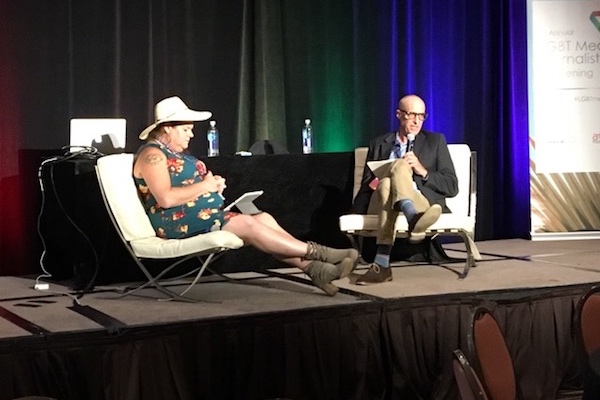
Bethany Grace Howe and Brian Malte (Photo by Karen Ocamb)
Convening MC Bethany Grace Howe, for instance, is a writer at HuffPo, and doctoral student at the University of Oregon where she is gathering facts and statistics about trans identity and the development of defense-related emotions. She also has a casual side-splitting sense of humor that disrupted the furrowed-brow thinking as we followed presenters such as digital archivist Matt Dellinger, who provided resources for archival storytelling and Brian Malte, executive director of Hope and Heal Fund, as he talked about working with the Williams Institute to research the relationship of gun violence to the LGBT community beyond the shooting at Pulse nightclub, a research report expected out next November.
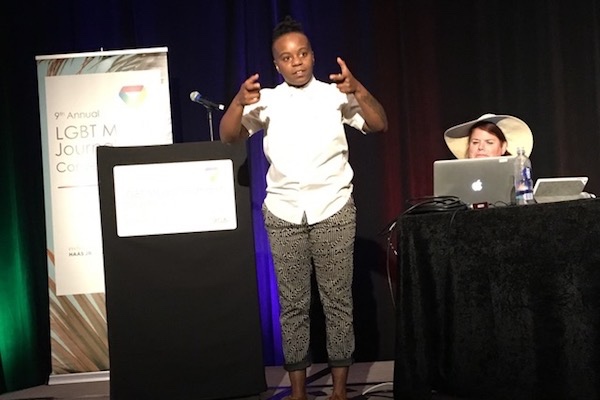
Kei Williams (Photo by Karen Ocamb)
There were also a number of personal development and intense off-the-record exchanges. Kei Williams, a queer transmasculine identified designer, writer, public speaker, organizer and founding member of Black Lives Matter Global Network in New York, led convening attendees in a series of “get-to-know-you” questions that broke down personal barriers some folks didn’t know were up: “Who are your people?” There was an off-the-record exchange with former Equality California Jim Carroll about his candid reflections on the battle over Prop 8, still a sore subject to many, and an on-the-record discussion with Evan Wolfson, former founder of the successful Freedom to Marry campaign who is now advising organizations on winning movement strategies and reminded everyone that marriage equality wasn’t a gift from the Supreme Court but was a hard-won victory changing hearts, minds and laws. Wolfson also said that while the times may be dark, he operates from a place of hope, recognizing that the LGBT community has made substantial progress and should fight building on success, no matter the brief setbacks.
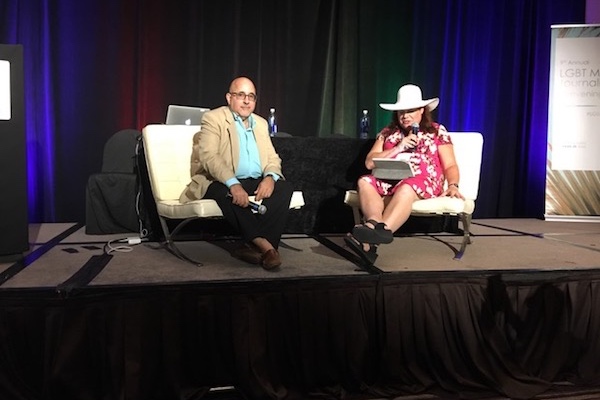
Evan Wolfson and Bethany Grace Howe (Photo by Karen Ocamb)
And there was a lively discussion about how to cover LGBT issues in red states, with Think Progress’ Zack Ford (celebrating his birthday!) and Buzzfeed’s Dominic Holden in hearty dispute with the panelists’ conclusions.
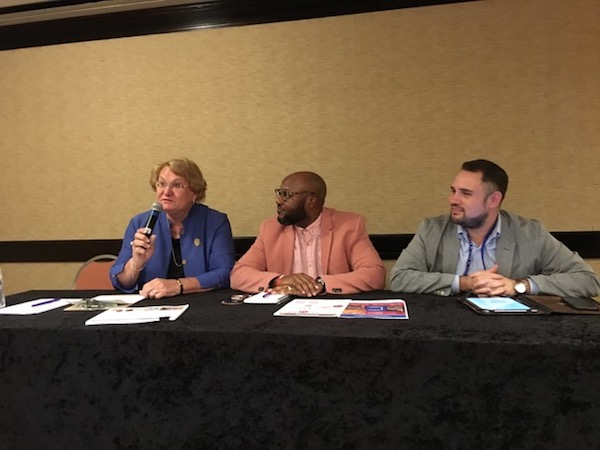
Palm Springs City Councilmember Lisa Middleton, AARP’s Nil-Quartelai Quartey, and Jason Rosendez, USAgainstAlzheimer’s Latino Network (Photo by Karen Ocamb)
And with the new format, LGBT media conveners got to attend NLGJA panels — such as Google fundamental tools for journalists, “Dead Names” and Real Lives in Obituaries, HIV & AIDS stories with HIV Plus Magazine’s Diane and Jacob Anderson-Minshall, and Gay and Graying, moderated by Palm Springs trans City Councilmember Lisa Middleton with AARP’s senior advisor and LGBT liaison Nil-Quartelai Quartey (who asked: “what keeps you up at night?”) and Jason Rosendez, Director of USAgainstAlzheimer’s Latino Network, who described alzheimer’s disease as “the second inconvenient truth.” There are an estimated 1 million LGBT seniors, a number expected to double by 2030— “the first out generation to grow old,” said Middleton; another estimate projects adults over 65 will outnumber children under 18 by 2035.
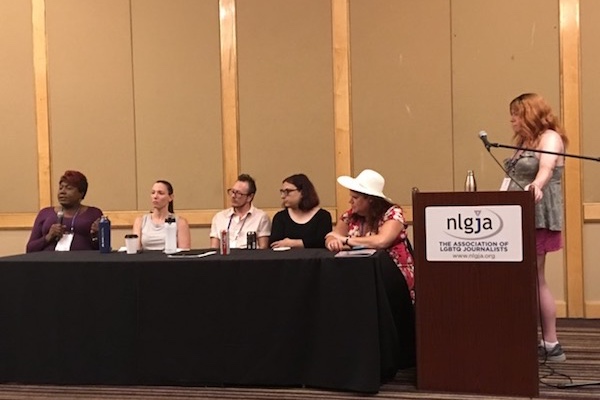
Monica Roberts, Brooke Sopelsa, Jacob Anderson-Minshall,Ina Fried, Bethany Grace Howe and Dawn Ennis, Trans 101 (Photo by Karen Ocamb)
One of the most moving panels was entitled very simply “Trans 101” with Ina Fried, Brooke Sopelsa, Jacob Anderson-Minshall, Bethany Grace Howe, with Monica Roberts asked to join from the audience, and MCed by Dawn Ennis. But it was anything but simple. Axios’ Ina Fried, a longtime member of NLGJA, remembered Los Angeles Times transgender sports columnist Mike Penner who publicly transitioned into Christine Daniels, with the help of friends like Ina and support from LA’s MCC Church. Christine was heralded and spoke at NLGJA’s 2007 convention, but was inwardly tormented, “de-transitioned,” and committed suicide Nov. 29, 2009. The LA Times, which had supported her transition, struggled to explain what happened. Ina and others who remembered Christine – and Mike – were still sad on the late afternoon of Sept. 8, 2018.
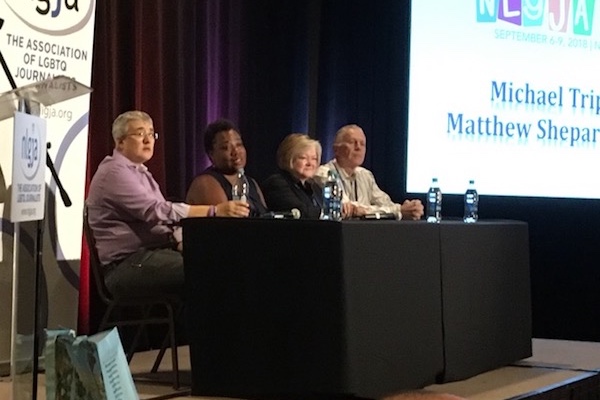
Cathy Renna, Beverly Tillery, Dennis and Judy Shepard of the Matthew Shepard Foundation (Photo by Karen Ocamb)’
NLGJA also held plenaries, the most stirring of which was the Michael Triplett Series: Matthew Shepard 20 Years Later with Dennis and Judy Shepard of the Matthew Shepard Foundation, Beverly Tillery, executive director of New York’s Anti-Violence Project, with longtime communications expert Cathy Renna serving as host. It was 20 years ago that University of Wyoming student Matthew Shepard was lured out of a local bar by two men, beaten, tortured and left to die hanging on a remote fence near Laramie, Wyoming on the night of Oct. 6, 1998. He died six days later of head injuries. His death became a media firestorm as reporters focused on what role his being gay played in his murder.
After reading news coverage, Renna left her New York office at GLAAD and flew to Wyoming to help Dennis and Judy Shepard deal with the massive media descending on them as the perpetrators went to trial. Matt would have been 42 this December. “If you’re under 45, you’re one of ours,” Dennis noted. “If we can’t take care of him, we can take care of the rest of our kids.” Judy said she is “angrier now than when she first started doing this work,” with hate crimes rising in this new political climate.
Tillery confirmed the rise, attributing it to “the anti-American rhetoric spewed by President Trump and this administration,” adding that now the violent attacks are “in our safe spaces,” like the Pulse nightclub. “They’re coming for our community,” she said. Judy Shepard noted the “fatal flaw” in the federal Matthew Shepard and James Byrd Jr. Hate Crimes Prevention Act of 2009 does not include mandatory enforcement or reporting, letting states like Mississippi claim to have no hate crimes. “We need to figure this out,” she said, since law enforcement doesn’t know what they’re looking for. Judy stressed the importance of reaching out to straight allies: “Honestly, they’re just waiting to be asked. We’re really interested and we have money,” she said to much laughter. “To be blunt—you all need to suck it up because we really need your help.”
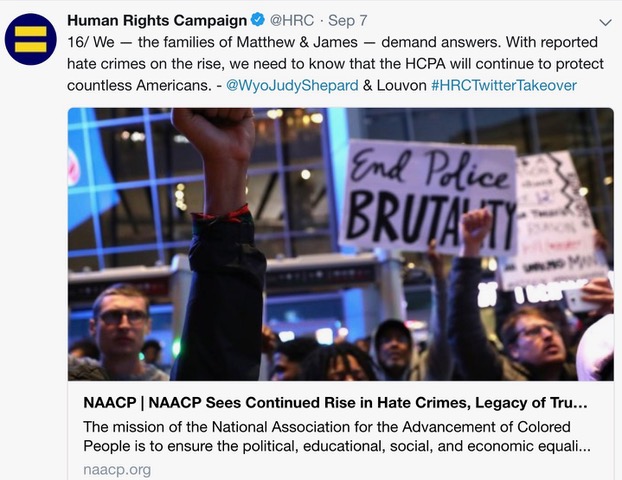
Mitchell Gold asked about the role anti-LGBT religious bigotry plays. “Religion is really our biggest roadblock to acceptance and equality for the LGBT community,” Judy Shepard said. “If it changed, it would change everything.” But the solution right now, she said, is to vote in the midterms. Judy also noted that she and Louvon Byrd “took over” the Human Rights campaign twitter feed on Sept. 7 to talk about the need to report hate crimes. James Byrd Jr was murdered by three white supremacists on June 7, 1998, dragged behind a pickup truck on an asphalt road for three miles until his body fell apart. The Shepards and the Byrd family worked together to get the federal hate crimes law passed.
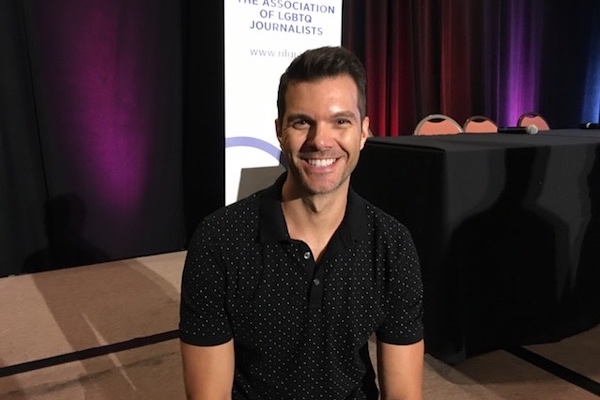
A.J. Gibson (Photo by Karen Ocamb)
Other NLGJA plenaries included “That’s So Hollywood,” moderated by Steve Holzer with West Hollywood-based author and TV host A.J. Gibson, Dr. Jon Paul Higgins, and Chris Azzopardi who made Jane Fonda cry when he asked her why gays love women of a certain age and a plenary featuring Monica Roberts, Donna Rossi, Karl Schmid, and David Begnaud, who talked about his reporting on the devastation of Hurricane Maria in Puerto Rico—he is reporting on Hurricane Florence right now.
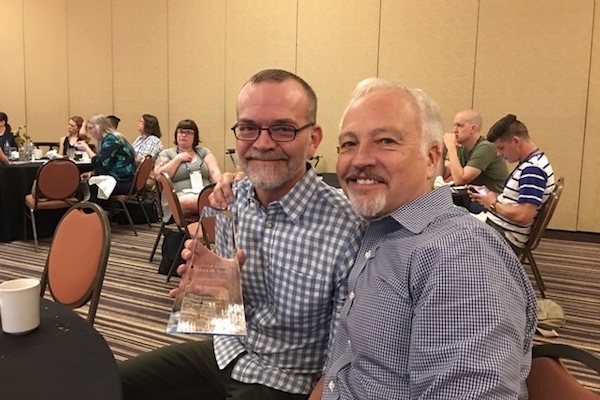
Bil Browning and Matt Foreman (Photo by Karen Ocamb)
The other benefit of the NLGJA and #LGBTMedia2018 convening was the personal networking. Bilerico Project founder Bil Browning, now with LGBTQ Nation, was given a “thank you” award by Matt Foreman for organizing the LGBT Media Convenings for many years. And I was surprised to learn that Cynthia Laird, editor of the Bay Area Reporter and Paul Schindler, editor of Gay City News in New York had never met, though each has toiled in the land of LGBT journalism for decades. Schindler said he and Duncan Osborne have launched the laborious task of digitizing and preparing old news clippings and remembrances in advance of the 50th anniversary of the Stonewall riots, anticipating that mainstream media will probably rely on facile information minus the nuances of the LGBT sensibility.
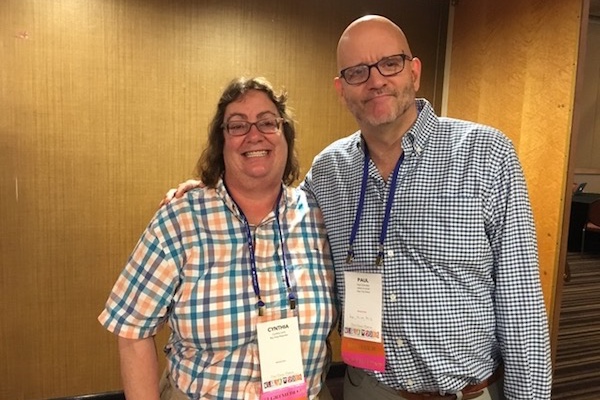
Cynthia Laird and Paul Schindler (Photo by Karen Ocamb)
This is only some of what occurred during the Haas LGBT Media Convening and the NLGJA convention – overshadowed by the casual, offensive transphobic remark made by Marshall McPeek. But for those in the rooms where it happened, new friendships, new insights and new data will surely inform reporting on LGBT issues going forward.
Los Angeles
Recent L.A. County report reveals record number of hate crimes against transgender and nonbinary community members
The county’s Commission on Human Relations (LACCHR) released its annual hate crime analysis, revealing a rising violence against LGBTQ+ Angelinos.

Last Thursday, Los Angeles County’s Commission on Human Relations (LACCHR) released its 2024 Hate Crime Report, which analyzes data compiled from over 100 reporting groups, including local law enforcement agencies, educational institutions, and community-based organizations like the TransLatin@ Coalition. In its 45-year history of compiling these reports, the LACCHR recorded an “unprecedented” amount of hate crimes in this most recent analysis.
The report states that there were 102 anti-transgender crimes, “the largest number ever documented in this report.” 95% of these reported incidents were violent.
Part of the reason for this increase in reported crimes is the expanding outreach LACCHR is trying to create with partner organizations, ensuring that queer community members feel increasingly safe in reporting crimes that have been committed against them. These “grassroots efforts” have proven invaluable in building community trust, according to Dr. Monica Lomeli, who leads the production of LACCHR’s annual hate crime report.
“For the LGBTQ community, [there’s] a history of not being heard, not being believed or being misgendered,” Lomeli told the Blade. “I remember us working with a lot of different law enforcement agencies [and] victims would tell us: ‘They keep misgendering me. They don’t believe me. They keep having me make different reports.”
Lomeli stresses that, for those who feel unsafe reporting hate crimes to law enforcement agents, there are other options. One of these pathways is the commission’s community-centered initiative and reporting system, LA vs Hate, which allows people to report hate crimes and access resources like multilingual reporting guides. There is also 211 LA, a program funded by the commission that provides free, confidential support in 140 languages.
The report is instrumental to the formation of initiatives focused on queer safety and is also a resource to various LGBTQ+ organizations as they track violence committed against their community members. But the collection of this data has not been smooth, especially in this current administration.
Lomeli explained that, earlier this year, the now-defunct Department of Government Efficiency (DOGE) reached out to various human rights organizations, including the LACCHR, and was aiming to gain access to and shut down the commission’s hate crime database. “There was an attempt to bring down our data,” said Lomeli, who described these attempts as an infringement on the general public’s ability to access the report’s findings.
Moving forward, the commission’s Network Against Hate Crime, which hosts quarterly meetings with leaders from law enforcement agencies, advocacy groups, educational institutions, and social services providers, will hold a briefing on the report and discuss collaborative solutions to support community members.
Lomeli hopes to bring LGBTQ+ issues to the “forefront” of one of these upcoming meetings, given the high number of hate crimes committed against queer community members that were highlighted in the report. LA vs Hate will also continue to host campaigns, marketing efforts, and awareness events to promote the equitable treatment and safe existence of queer and other marginalized Angelinos.
California
Ricardo Lara, John Heilman inducted into Victory Institute’s Hall of Fame
Induction took place in D.C. on Saturday
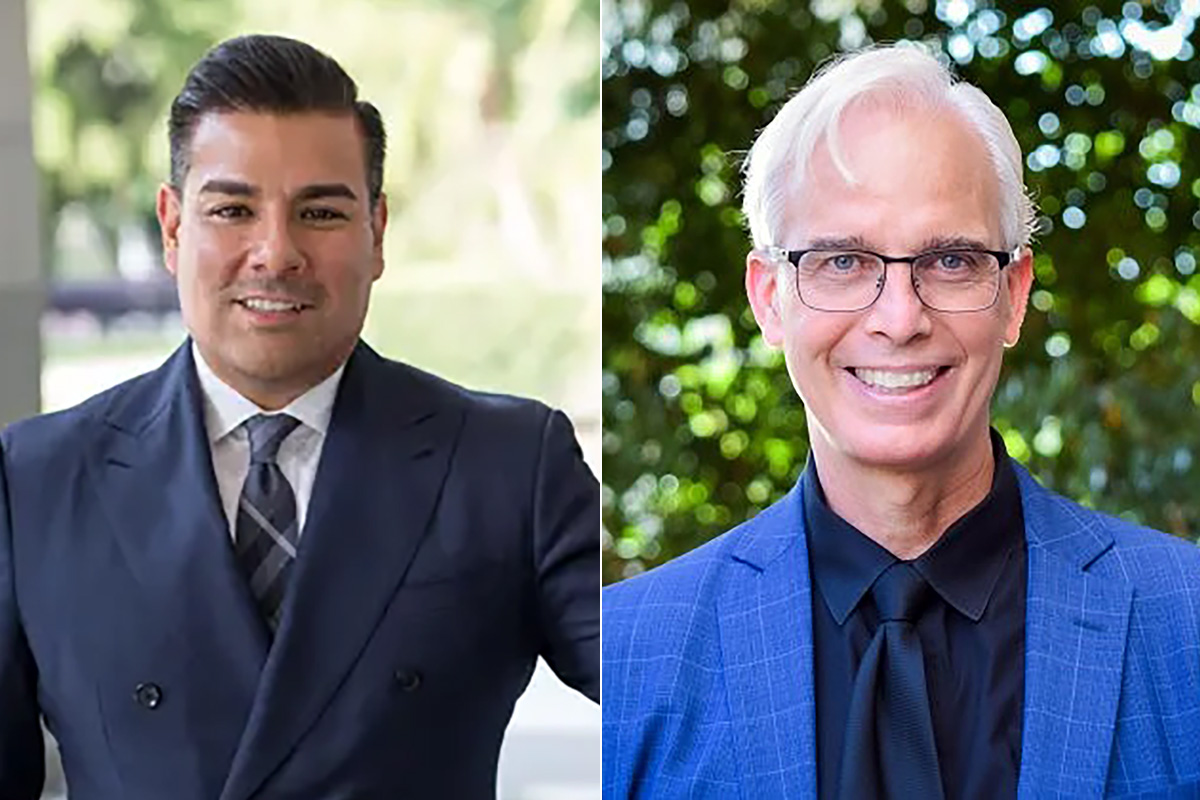
The LGBTQ+ Victory Institute on Saturday inducted California Insurance Commissioner Ricardo Lara and West Hollywood Vice Mayor John Heilman into its LGBTQ+ Political Hall of Fame.
The inductions took place during the Victory Institute’s annual International LGBTQ+ Leaders Conference in D.C.
U.S. Rep. Robert Garcia (D-Calif.), San Diego Mayor Todd Gloria, San Leandro Councilmember Victor Aguilar Jr., are among those who attended the conference. Evan Low, the LGBTQ+ Victory Institute’s president, served in the California State Assembly from 2014-2024.
Former state Senate President Pro Tempore Toni Atkins, former Assembly Speaker John Pérez, former state Sen. Christine Kehoe, former Palm Springs Mayor Ron Oden, Harvey Milk, a member of the San Francisco Board of Supervisors who was the state’s first openly gay elected official, and José Sarria, who ran for the San Francisco Board of Supervisors in 1961, have also been inducted.
National
Study shows ‘pervasive mistreatment of LGBTQ people by law enforcement’
Findings claim nationwide police misconduct, including in D.C., Va., Md.

The LGBTQ supportive Williams Institute, an arm of the University of California at Los Angeles School of Law, released a report last month citing multiple research studies conducted over the past 25 years showing past and “ongoing” mistreatment of LGBTQ people by law enforcement throughout the United States.
“Findings show that LGBTQ communities – particularly LGBTQ people of color, youth, and transgender and gender nonconforming individuals – have faced profiling, entrapment, discrimination, harassment, and violence from law enforcement for decades, and this mistreatment continues to be widespread,” according to a Williams Institute statement.
“Experiences of police mistreatment may discourage LGBTQ people from reporting crimes or engaging with law enforcement,” Joshua Arrayales, the report’s lead author and Williams Institute Law Fellow said in the statement.
“Reporting crimes is essential for accurate crime statistics, property allocation of crime prevention resources, and support services that address the unique needs of LGBTQ survivors,” he said.
The 59-page report cites the findings of two dozen or more studies and surveys of LGBTQ people’s interaction with police and law agencies for the past 25 years through 2024 conducted by various organizations, including the ACLU, the National Coalition of Anti-Violence Programs, the Williams Institute, and local government agencies.
But the report does not provide a breakdown of where police abuse against LGBTQ people occurred by specific police departments or locations. Instead it provides survey research findings of large groups of LGBTQ people who responded to a survey in different locations of the U.S.
Among other things, those surveys have found “LGBTQ people are more likely than non-LGBTQ people to report being stopped by police, searched by police, arrested, and falsely accused of an offense,” the Williams Institute statement accompanying the report says. “LGBTQ people also report substantial rates of verbal harassment, physical harassment, sexual harassment, and assault,” it says.
The report itself cites surveys of LGBTQ people’s interactions with police in D.C., Baltimore, and Virginia but does not give specific cases or identify specific police departments or agencies.
“A 2022 study based on interviews with 19 Black transgender women from Baltimore and Washington, D.C. identified a theme of re-victimization while seeking help from police,” the report says. “One participant noted that male officers asked what she did to cause her own abuse,” according to the report.
“Other participants expressed that when a knowledgeable officer was present, such as an LGBTQ+ liaison, they felt more inclined to reach out for help,” it says.
The report also states, “A 2024 study based on interviews with 44 transgender people in Virginia documented two instances of transgender women being pulled over for broken tail lights and then being mistreated once officers discovered they were transgender based on their IDs.” The report does not reveal the specific location in Virginia where this took place.
Other locations the report cites data on anti-LGBTQ conduct by police include New York City, Chicago, Los Angeles, Palo Alto, Newark, N.J., and Austin and San Antonio in Texas.
The full report can be accessed at williamsinstitute.law.ucla.edu.
West Hollywood
Administration refused to honor World AIDS Day; residents gathered with defiance, grief and love
Yesterday, members of the APLA Health Writers Group read moving stories to a large group of locals gathered at the AIDS monument.
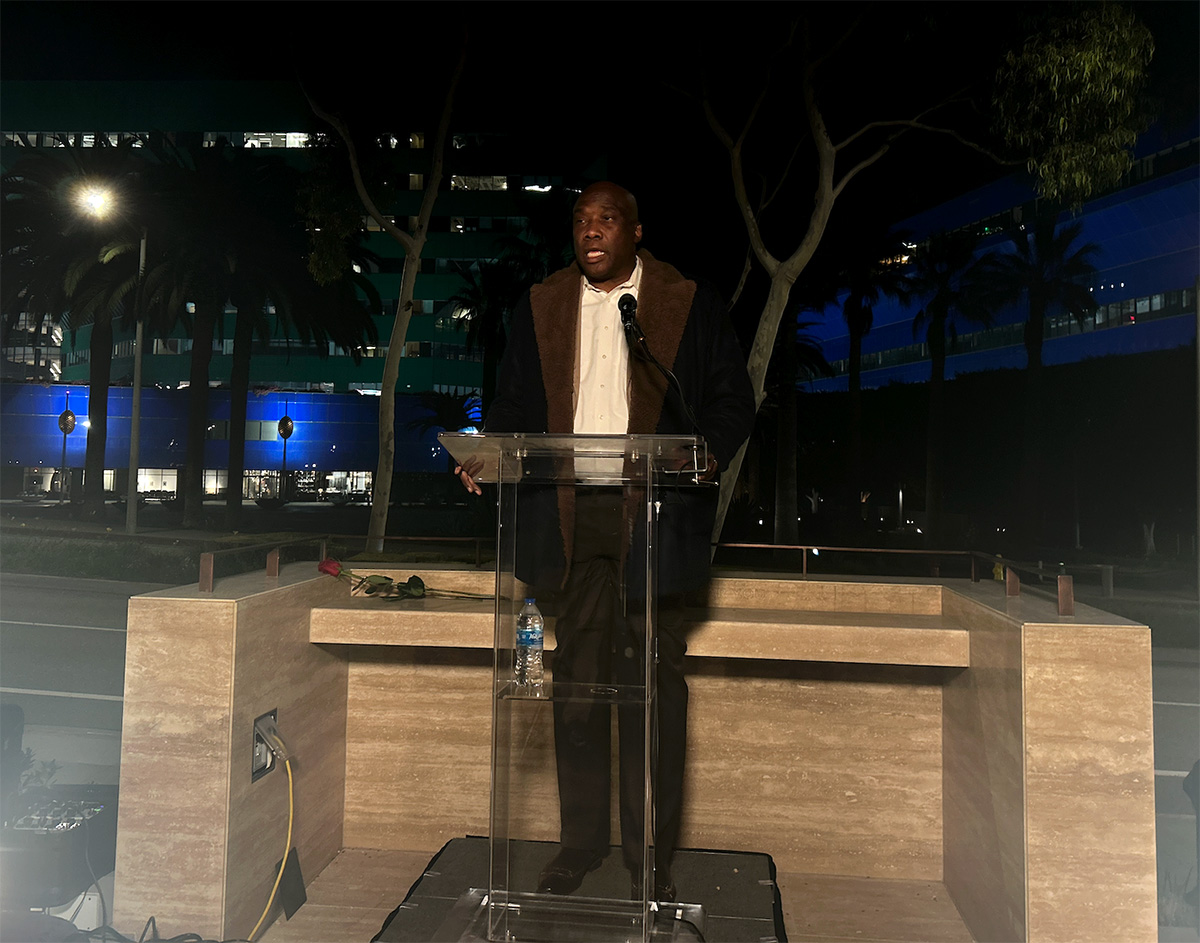
On Monday, the federal administration did not honor World AIDS Day, for the first time since the international awareness day was created in 1988. In addition to significant funding cuts to organizations focusing on HIV preventative treatment and care, the government’s halting of this commemoration perpetuates a dismissive system of inaction against LGBTQ+ people.
And yet, over 50 community members filled the empty spaces of West Hollywood’s AIDS monument yesterday evening, waiting in the night chill as city officials delivered impassioned statements and writers from APLA Health read personal pieces that centered a grief and love for those lost to the epidemic.
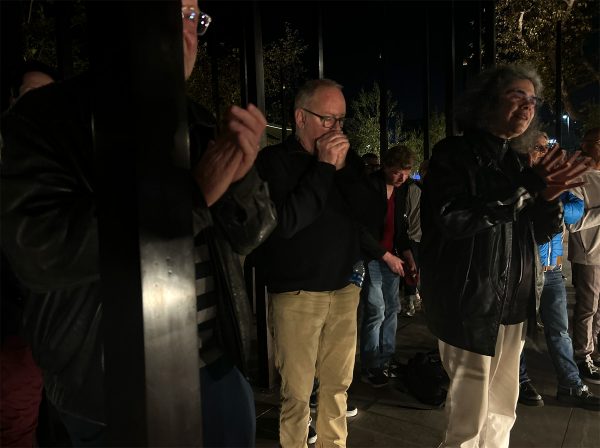
Before the readings began last night, West Hollywood vice mayor John Heilman asked for residents to join him in a righteous rage against administrative apathy. “I want to ask us all to reflect for just a moment about all of the people we lost…I want us to reflect and get angry,” said Heilman. “We have a fucking president who won’t even recognize World AIDS Day.”
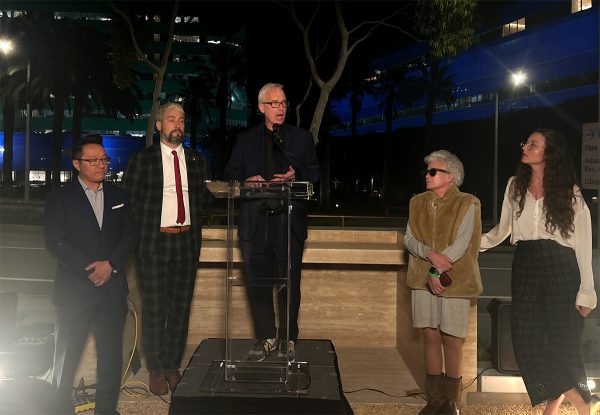
Irwin Rappaport, board chair for STORIES: the AIDS monument, echoed this immense disappointment. “Many of us here tonight lived through the 1980s, so we know what that’s like,” Rappaport said. “We also know that because of that neglect, because of that lack of caring from the federal government, we have to care for one another — and we know how to do that. When we don’t have recognition from others, we know how important it is to preserve our own history, to tell our own stories.”
Through heavy silence, five writers from APLA Health’s writers group stood tall before a podium and shared intimate writings they created about the epidemic and its personal impact on them. The collective was established in 1989 to provide an inclusive, expressive space for HIV-positive writers and allies to work on their writing and learn how to share their stories.
Writer Brian Sonia Wallace, who served as West Hollywood’s poet laureate from 2020 to 2023, has been working with the writers group for the last four years to help them hone and refine their narrative voices as they share their heaviest grief and the depths of their love for the people they lost to HIV and AIDS.
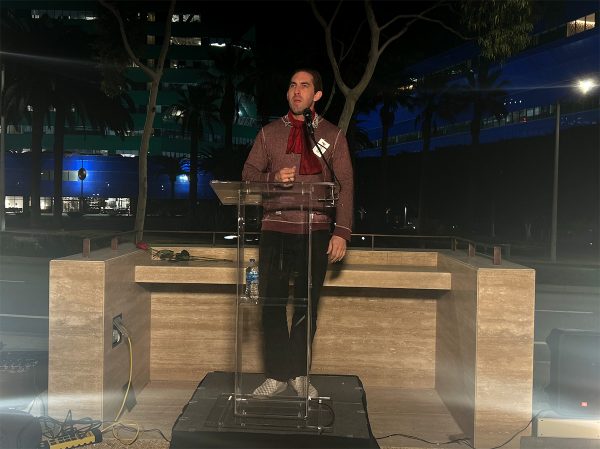
Hank Henderson, one of these writers, read from a diary entry from November 29, 1991. His voice, clear and strong, wavered as he shared about the death of his dear friend Richard. In a piece filled with lush, rich detail, painted clearly with a strong and loving voice, Henderson recounted a memory with Richard during the latter’s last years.
“The Santa Barbara sky is clear blue forever today…Yesterday came and went like a half-remembered dream between snooze alarms,” Henderson recited. “Last year, we walked to the beach. We spent hours there, played frisbee ourselves, brought the dog. Richard even yelled out 30-minute tanning turnover alarms. Yesterday, he took tiny, labored steps back to the car, used my shoulder to keep himself from falling over. Nobody said anything. We just pretend it’s normal.”
Another writer, Austin Nation, shared the story of being told he was HIV-positive at 26 years old. As a young nurse, he remembered the shock of seeing “young, beautiful men” arriving at the hospital covered in “purple, blotchy sores.” When he received his own test results, a paralyzing terror washed over his body. An incredulity followed the fear: why was this happening to him? “I got this thing for what?” Nation spoke. ”For having fun? For making love? And now it’s gonna cost me my life?”
But as he stood before the crowd, now 63 years old, he was met with applause and joy as he stated and repeated: “I’m still here. I’m still here.” The writers, in their grief and loss, have come to a place where they are able to share these stories, empowered and held. “In a world that writes off people with stories like mine,” Nation said. “It’s a hell of a good day to be alive.”
Kristie Song is a California Local News Fellow placed with the Los Angeles Blade. The California Local News Fellowship is a state-funded initiative to support and strengthen local news reporting. Learn more about it at fellowships.journalism.berkeley.edu/cafellows.
National
Faith leaders denounce anti-transgender attacks
‘You are holy. You are sacred. We love you.’

This past Trans Awareness Week, 10 heads of diverse religious traditions issued a statement proclaiming that transgender, intersex, and nonbinary people are worthy of love, support, and protection. Led by Rev. Dr. Sofía Betancourt, president of the Unitarian Universalist Association, representatives from the Universal Fellowship of Metropolitan Community Churches, The Fellowship of Affirming Ministries, the Union for Reform Judaism, the Presbyterian Church, the Christian Church (Disciples of Christ), The Episcopal Church, the United Church of Christ, and Reconstructing Judaism called out the violent and systemic persecution of trans, nonbinary, intersex, and queer people–proclaiming that their faith and their humanity urged them to affirm that trans, intersex, and quere people are “sacred” and “holy.”
Their statement comes at a critical time. Over the past three months, Trump and his Cabinet’s anti-trans rhetoric has only intensified, with a report released late September by journalist Ken Klippenstein in which national security officers leaked that the FBI is planning to classify trans people as “extremists.” By classifying trans people as “Nihilistic Violent Extremists,” far-right groups would have more “political (and media) cover,” as Abby Monteil reports for them, for anti-trans violence and legislation.
While the news is terrifying, it’s not unprecedented – the fight against trans rights and classification of trans people as violent extremists was included in Project 2025, and in the past several weeks, far-right leaders’ transphobic campaign has expanded: boycotting Netflix to pressure the platform to remove trans characters, leveraging anti-trans attack ads in the Virginia governor’s race and banning professors from acknowledging that trans people exist. In fact last month, two Republican members of Congress called for the institutionalization of trans people.
It seems that the government shutdown was predicated, at least partially, on Trump’s own anti-trans policies that were attached as riders in the appropriations bill.
It’s a dangerous escalation of transphobic violence that the Human Rights Campaign has classified as an epidemic. According to an Everytown for Gun Safety report published in 2020, the number of trans people murdered in the U.S. almost doubled between 2017 and 2021. According to data released by the Gun Safety report from February 2024, 34 percent of gun homicides of trans, nonbinary, and gender expansive people remain unsolved.
As Tori Cooper, Director of Community Engagement for the Transgender Justice Initiative for the Human Rights Campaign Foundation, this violence serves a purpose. “The hate towards transgender and gender expansive community members is fueled by disinformation, rhetoric and ideology that treats our community as political pawns ignoring the fact that we reserve the opportunity to live our lives full without fear of harm or death,” Cooper said.
The faith leaders came out in this statement to affirm that it is their spiritual and human imperative to call out this escalating violence and protect trans, nonbinary, intersex, and queer people. The leaders acknowledge that historically and today, religion is used as a weapon of hate to degrade and deny the human dignity of LGBTQ+ peoples. The Supreme Court is hearing Chiles v. Salazar, a case about the constitutionality of a Colorado ban of conversion therapy for minors, with the majority of conversion therapy practices being faith based. And despite the Supreme Court declining to hear a case challenging the constitutionality of same-sex marriage conferred in Obergefell v. Hodges, efforts to end marriage equality remain ongoing with Katy Faust’s End Obergefell movement.
“During a time when our country is placing their lives under increasingly serious threat,” the statement reads, “there is a disgraceful misconception that all people of faith do not affirm the full spectrum of gender – a great many of us do. Let it be known instead that our beloveds are created in the image of God – Holy and whole.”
The faith leaders argue that commendation of LGBTQ peoples and religiously motivated efforts to deny their dignity and rights is not the belief of all faith communities, and far-right Christian nationalist communities and others who uphold homophobia and seek to exact it writ large in the United States do not speak for all faith leaders.
This is a critical piece of the statement and builds on historical precedence. During the 1980s AIDS crisis, when far-right Christian leaders like Jerry Falwell, one of the founders of the Moral Majority, stated that HIV was “God’s punishment” for LGBTQ+ people and indicative of a broader moral decline in America, affirming faith communities came out to affirm the dignity and divinity of queer people. As funeral homes and churches refused to prepare the dead and bury them, some faith communities stepped up to say that these homophobic leaders do not speak on behalf of all people of faith.
In 1985, the United Church of Christ General Synod urged its member congregations to claim and declare themselves “Open and Affirming,” in order to express their welcome and support for LGBTQ+ people, and two years later, the Church of the Brethren issued a statement titled “A Call to Compassion” where conference members urged member congregations to speak out boldly against discrimination, provide direct care to people with HIV/AIDS, and actively educate themselves and others to stop the spread of fear and prejudice surrounding the disease.
Just one year later, the Evangelical Lutheran Church in America Church Council issued a statement, “AIDS and Church’s Ministry of Caring,” which outlined the ways in which welcoming, ministering to and advocating on behalf of people with HIV/AIDS is critical to their mission. Even the US Conference of Catholic Bishops, which earlier this month banned gender-affirming care at Catholic hospitals, issued a statement in 1987 calling discrimination against people with HIV/AIDS “unjust and immoral,” and denouncing the label of “innocent” or “guilty” patients.
Thus, the faith leaders’ statement this past week builds on a rich history of faith communities fighting the stigma that far-right faith groups perpetuate about LGBTQ+ people and committing to action. What sets this latest statement apart is its decidedly interfaith heart, which speaks to the history of the Pride Interfaith Service in Washington, DC that was first started by a group of faith leaders and lay people who gathered at the AIDS Memorial quilt.
As the statement reads, “Our scriptures vary, but they share a common conviction. As we make justice our aim we must give voice to those who are silenced. Our shared values, held across many faiths, teach us that we are all children of God and that we must cultivate a discipline of hope, especially in difficult times. As such, we raise our voices in solidarity to unequivocally proclaim the holiness of transgener, nonbinary, and intersex people, as well as the recognition of the entire spectrum of gender identity and expression.”
The statement ended by arguing that they need to call out the violence they are witnessing. Their silence, they argue, would be in compliance and reinforce the idea that homophobic religious leaders and lay people speak on behalf of all people of faith. Their statement is not only words, however, it is a written promise affirming the dignity and holiness of queer people but also to protect them in the face of increasing violence and persecution.
“When people of faith and conscience stay silent in the face of oppression, we are all made less whole. When people of faith and conscience speak out against that which violates the sacred in its own name, we have the power to stay the hand of sin. Transgender, nonbinary, and intersex people are vulnerable today,” the statement concluded.
“Our faiths, our theologies, and our practices of prophetic witness call on us to say with one voice to transgender people among us: ‘You are holy. You are sacred. We love you. We support you, and we will protect you.’”
West Hollywood
West Hollywood kicks off community-focused programming for World AIDS Day
Since 1988, queer communities have come together on Dec. 1st to honor siblings and allies lost to the AIDS epidemic.
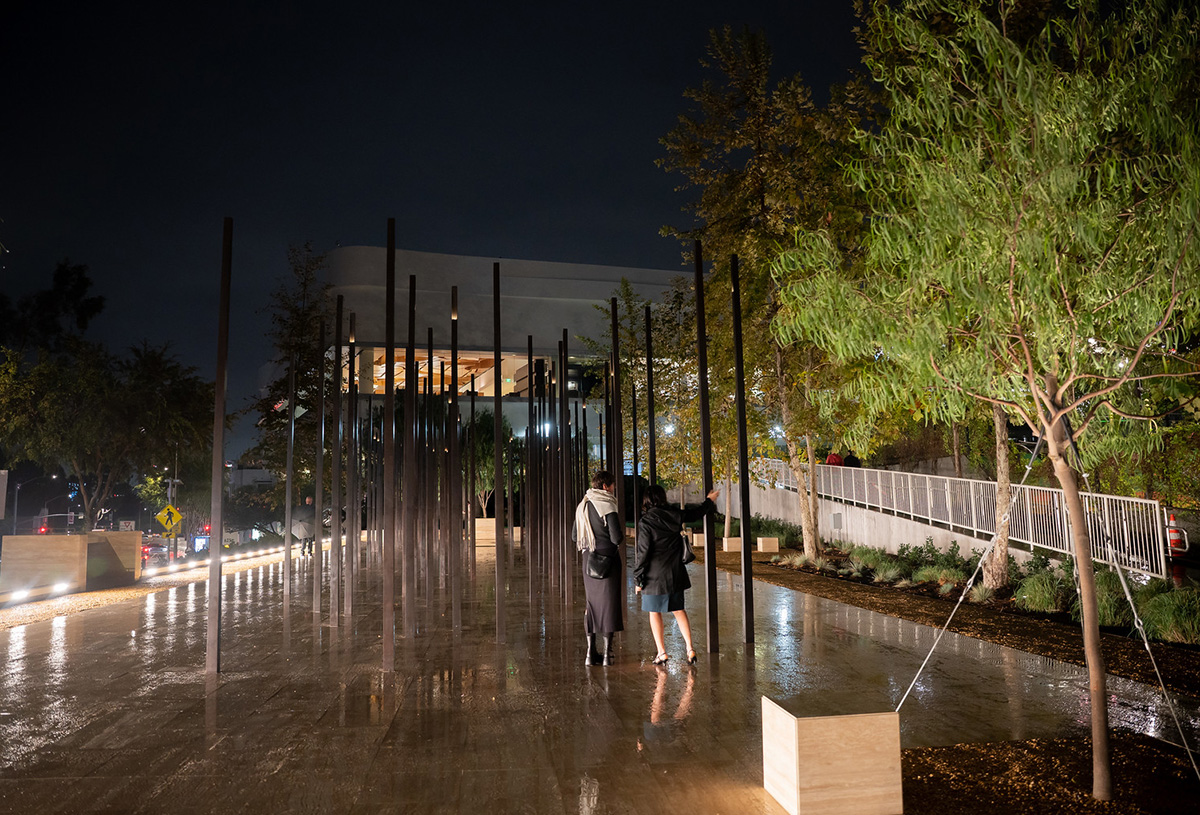
Since 1988, LGBTQ+ communities have come together on Dec. 1st to commemorate queer siblings and allies lost to the AIDS epidemic. This year’s World AIDS Day follows the theme “Overcoming disruption, transforming the AIDS response” and highlights the substantial funding cuts to research, health services, and community initiatives that have prioritized the safety of people with HIV and AIDS. The theme challenges people to think about “radical” ways to organize together and ensure that those who are impacted are able to access the care, treatment, and awareness that they need.
Beginning today, the City of West Hollywood is kicking off programming to recognize the historical transformation that local queer communities experienced during the AIDS epidemic. A panel from the AIDS Memorial Quilt will be available for viewing at the City’s Council Chambers at 625 N. San Vicente Boulevard through Monday, Dec. 15th.
Known as the largest community arts project in history, the Quilt is a powerful memorialization of loved ones who died during the epidemic. Each panel of the Quilt contains a story of remembrance, immortalizing a life cut short during the crisis. The project currently contains over 50,000 panels dedicated to over 110,000 people, all woven together in a 54-ton tapestry piece.
If you’re visiting the panel today, there will be an additional gathering opportunity tonight at the West Hollywood Park for STORIES: the AIDS Monument. From 5:30 to 8:30 p.m., members from the HIV-positive writers collective APLA Health Writers Group will present intimate readings that reflect on their experiences. Community members will be allowed time to wander through the monument and also preview the new Herb Ritts: Allies & Icons exhibition at ONE Gallery after the program. The art show includes striking black and white portraits of activists who stood in alliance with those most impacted during the AIDS epidemic.
Additionally, fresh flowers will be placed on the bronze plaques that line the City’s AIDS Memorial Walk. During the AIDS epidemic, West Hollywood was at the center of a rampant grief and loss that juxtaposed vibrant programming and efforts that boosted healing and fought against stigma and violence. It continues to be a vibrant space that houses various organizations and memorial spots that continue to uphold the revolutionary history and advocacy work that has continued since the epidemic’s beginnings.
Today, West Hollywood is in the process of executing its HIV Zero Strategic Plan, an initiative that began in 2015. Its goals include: expanding healthcare access for people living with HIV and AIDS, reducing the rate of infections, lessening health disparities and inequities for those impacted, and slowing the disease’s progress from advancing to AIDS.
According to West Hollywood mayor Chelsea Byers at a recent Cityhood event, the initiative carries forth the City’s “bold vision” and commitment to ensuring marginalized community members living with HIV do not face the life-threatening discrimination and health barriers that their elders experienced.
To learn more about the City’s programming, read here.
Kristie Song is a California Local News Fellow placed with the Los Angeles Blade. The California Local News Fellowship is a state-funded initiative to support and strengthen local news reporting. Learn more about it at fellowships.journalism.berkeley.edu/cafellows.
West Hollywood
Today, West Hollywood celebrates 41 years of queer cityhood
WeHo’s city officials are trying to preserve the fight for queer safety and rights that began decades before.
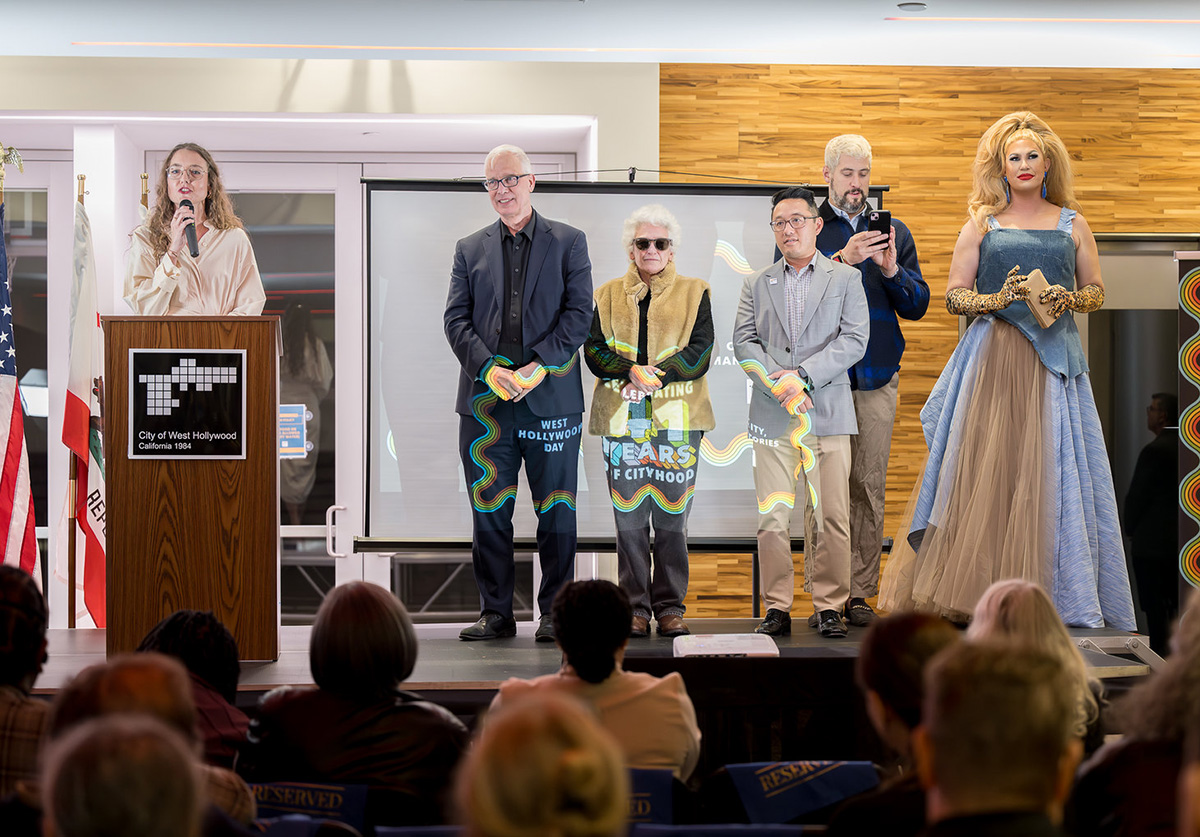
On Nov. 29th, 1984, West Hollywood was incorporated as an independent City, making its sovereignty official and solidifying it further as a sanctuary for LGBTQ+ community members, their stories, and their freedoms. Inspired by other prominent gay neighborhoods like New York’s West Village and San Francisco’s Castro District, West Hollywood was established by local queer advocates and residents. Their first city council was made up of a majority gay governing body — the first in the world, according to the West Hollywood History Center.
This political legacy, and the city’s vibrant and proudly queer history, continues to be preserved. On Monday’s celebratory event, West Hollywood mayor Chelsea Byers announced that the City’s current council “continues to be a majority-LGBTQ+ body,” holding tightly onto a “spirit” that reflects, prioritizes, and fights for Los Angeles’ queer community.
West Hollywood has been through various transformations, cocooning and revitalizing itself through the country’s evolving political and cultural upheavals. It has long been home to a ravishing nightlife that celebrates LGBTQ+ expression, and was a focal point for queer-led liberation and activism in the late 1960s and early 1970s. Trailblazers like Morris Kight led the first gay pride march through West Hollywood’s streets in 1970 and opened the Los Angeles LGBT Center to nourish the City’s robust and blossoming queer communities.
Today, West Hollywood continues to be the place where queer organizers and residents plant roots. Earlier this month, STORIES: the AIDS monument opened up in the City’s park after over a decade of work, shining a light on the legacies of gay activists, artists, historians, and community members who fought to survive as anti-gay stigma led to the erasure of their rights and lives.
As waves of anti-LGBTQ+ hate and violence continue to surge through the country, West Hollywood elected officials aim to continue doing the critical work that began decades before them: the work that protects the ability of queer residents to advocate for themselves, to live with protections and dignity, and to relish in joy. Mayor Byers is inspired by the resilience of the community members who stood together to establish this independent City in 1984. “The people who lived here…wanted a city with strong protections for renters, with progressive policies, and with a local government that would actually reflect and protect the people who call this place home,” said Byers, at the Nov. 24th celebration.
Over 40 years later, these needs have not changed. The way forward? Remembering and fighting for that initial promise and hope. “We are a chorus. We are a tapestry,” said Byers. “We are the product of thousands of people who, for more than four decades, have dared to say: We can build something better here.”
Kristie Song is a California Local News Fellow placed with the Los Angeles Blade. The California Local News Fellowship is a state-funded initiative to support and strengthen local news reporting. Learn more about it at fellowships.journalism.berkeley.edu/cafellows.
Crime & Justice
SoCal gay couple alleges Uber driver refused them service and “chased” them with a bat
Los Angeles attorney Brian Breiter is assisting the couple with civil claims against the driver and Uber, calling into question queer safety on rideshare apps.

Note: The couple’s names have been kept anonymous by their attorney to avoid retaliation from Uber. They will be referred to as “J.” and “D.”
On Saturday, Nov. 8th, J. and D. shared a kiss during their Uber ride in San Diego’s queer-friendly North Park neighborhood when, suddenly, their driver pulled off the freeway. When the couple alerted him that he had taken the wrong exit, the driver said he would be letting them out because he did not “support [their] kind,” according to J.
It was at this point that J. began to record the interaction. In a 21-second clip provided to the Blade, J. and D. can be heard questioning the driver why they are being told to leave the vehicle when they had not yet arrived at their destination. Stranded in unfamiliar surroundings late at night, the couple responded in shock when the driver replied: “Because I don’t support you.”
In the video, J. asked explicitly: “You don’t support gay people?” to which the driver said: “No.”
J. and D. allege that after pulling over, the driver stepped out, retrieved a bat from his trunk, and cocked it back as if to strike them. At this point, the couple bolted, frantically running while dialing for the police. They ducked behind cars, panicking and hiding while waiting for officers to arrive. “I haven’t experienced another time in my life where I would say that I really was in fear of dying,” D. told the Blade. “We were just hiding there, hoping that we were going to survive at that point.”
Since then, the couple has sought out Los Angeles attorney Brian Breiter to represent them in a civil claim against the driver and Uber. Breiter explains that he is in the process of drafting the lawsuit, which includes claims of intentional infliction of emotional distress and civil assault against the driver as well as claims of negligent hiring, screening and training against Uber.
Breiter told the Blade that since his office sent a representation letter to Uber, there has been minimal contact from the company — no concessions, apology or accountability.
But, a spokesperson claims they have taken one concrete action in the case.
“Everyone deserves to feel safe, welcome, and respected when using Uber. Hate has no place in our society, and we do not tolerate any form of discrimination on the Uber platform,” an Uber spokesperson wrote to the Blade. “As soon as this was reported to us, we banned the driver from the platform.”
While this bit of news has been “relieving” for J. and D., it does not necessarily signal Uber’s readiness to improve their hiring, screening or training guidelines to protect their LGBTQ+ riders. “Removing this one driver does not prevent this from happening again,” Breiter told the Blade. “Unless Uber implements meaningful safety measures and proper screening, LGBTQ+ passengers and the public at large remain at risk.”
In October 2023, Uber Mexico created an LGBTQ+ mobile training initiative to strengthen their non-discrimination policy — but it remains unclear whether this training has been implemented more widely throughout the platform.
LGBTQ+ safety on these rides continues to be an understated issue, and J. and D.’s stories are not singular. On online forums, queer people have long shared their experiences with harassment and discrimination based on their gender and sexual identities. They take to the internet to warn others, understanding that: when there is no systemic change, they must rely on one another to be heard and to protect their communities.
Today, J. and D. do not feel safe using Uber or other rideshare apps. They are constantly reassessing and second-guessting their behaviors in public, for fear of violence. “We’re both very traumatized over this incident. [Recently] we went to dinner and we didn’t want to hold hands in public,” said J. “Because when we did kiss in the Uber, this man hate-crimed us and chased us down the street…It has just been really overwhelming and emotionally and physically draining.”
Kristie Song is a California Local News Fellow placed with the Los Angeles Blade. The California Local News Fellowship is a state-funded initiative to support and strengthen local news reporting. Learn more about it at fellowships.journalism.berkeley.edu/cafellows.
Los Angeles
LGBTQ+ community calls out Radio Korea over host’s homophobic comments; station acknowledges but skirts accountability
On Nov. 3rd, Radio Korea host Julie An claimed that “gay people began the spread of AIDS” on a talk show broadcast by the station.

On Monday, Nov. 3rd, Radio Korea aired its regular morning talk show program, where one of its hosts, Julie An, discussed her lack of support for the LGBTQ+ community, citing her religious beliefs. She also went on to comment that gay people spread HIV and AIDS, and that conversation therapy — which has been linked to PTSD, suicidality, and depression — is a viable practice. Clips of this have since been taken down.
Radio Korea offers Korean language programming to engage local Korean American and Korean immigrant community members. Its reach is broad, as Los Angeles is home to the largest Korean population in the U.S, with over 300,000 residents. As An’s words echoed through the station’s airwaves, queer Korean community members took to social media to voice their concern, hurt, and anger.
In a now-deleted Instagram post, attorney, activist, and former congressional candidate David Yung Ho Kim demanded accountability from the station. Writer and entertainer Nathan Ramos-Park made videos calling out Radio Korea and An, stating that her comments “embolden” people with misinformation, which has the ability to perpetuate “violence against queer people.”
Community health professional Gavin Kwon also worries about how comments like An’s increase stigma within the Korean immigrant community, which could lead to increased discrimination against queer people and their willingness to seek health care.
Kwon, who works at a local clinic in Koreatown, told the Blade that comments like An’s prescribe being gay or queer as a “moral failure,” and that this commonly-held belief within the Korean immigrant community, particularly in older generations, strengthens the reticence and avoidance clients hold onto when asked about their gender or sexual orientation.
“When you stigmatize a group, people don’t avoid the disease — they avoid care,” Kwon explained. “They avoid getting tested, avoid disclosing their status, and avoid talking openly with providers. Stigma pushes people into silence, and silence is the worst possible environment for managing any infectious disease.”
For weeks, Radio Korea did not offer a direct response to the public criticism. Its Instagram feed continued to be updated with shorts, featuring clips of its various hosts — including An.
On Friday, Radio Korea CEO Michael Kim released an official statement on the station’s YouTube page. In this video, Kim stated that An’s comments “included factual inaccuracies” and that the station “does not endorse or share the personal opinions expressed by individual hosts.” Kim also stated that Radio Korea “welcomes members of the LGBT community to share their perspectives” in order to deepen understanding through dialogue.
Afterwards, Kim continued that though he acknowledges the “pain” felt by queer community members, he concluded: “I don’t think Radio Korea needs to apologize for what was said any more than Netflix should apologize for what Dave Chappelle says, or any more than Instagram or TikTok should apologize for what people say on their platforms.”
Kim then offered a justification that An’s statements were “not part of a news report,” and that he was “disappointed” that David Yung Ho Kim, specifically, had been vocal about An’s comments. Kim stated that he was the first person to interview David in 2020 during his congressional campaign, and that he had provided the candidate a platform and opportunity to educate listeners about politics.
“After all these years, the support Radio Korea has given him,” said Kim, “the support I personally gave him, even the support from other Radio Korea members who donated or even volunteered for him — he dishonestly tried to portray Radio Korea as being an anti-gay organization.”
Kim went on to criticize David’s purported “hurry to condemn others,” and also questioned if David has disowned his father, who he states is a pastor. “What kind of person is David Kim, and is this the kind of person we want in Congress?” Kim asked viewers, noting that Koreatown is “only about three miles from Hollywood, and some people just like to perform.”
At the end of the video, Kim stated that his duty is to guard the legacy of the station. “My responsibility is to protect what was built before me and ensure that Radio Korea continues serving this community long after today’s momentary controversies disappear,” Kim said.
For community members and advocates, this response was unsatisfactory. “The overall tone of the statement felt more defensive than accountable,” Kwon wrote to the Blade. “Instead of a sincere apology to the LGBTQ+ community that was harmed, the message shifts into personal grievances, political dynamics, and side explanations that don’t belong in an official response.”
Kim’s portrayal of the criticism and calls to action by community members as a “momentary controversy” paints a clearer picture of the station’s stance — that the hurt felt and expressed by its queer community members is something that will simply pass until it is forgotten. An continues to be platformed at Radio Korea, and was posted on the station’s social media channels as recently as yesterday. The station has not outlined any other action since Kim’s statement.
Kristie Song is a California Local News Fellow placed with the Los Angeles Blade. The California Local News Fellowship is a state-funded initiative to support and strengthen local news reporting. Learn more about it at fellowships.journalism.berkeley.edu/cafellows.
Los Angeles
Forgetting queer pioneer Morris Kight is “impossible”: Advocates and friends share stories at remembrance
On Saturday, Nov. 22nd, Kight’s ashes were interred at Hollywood Forever Cemetery.
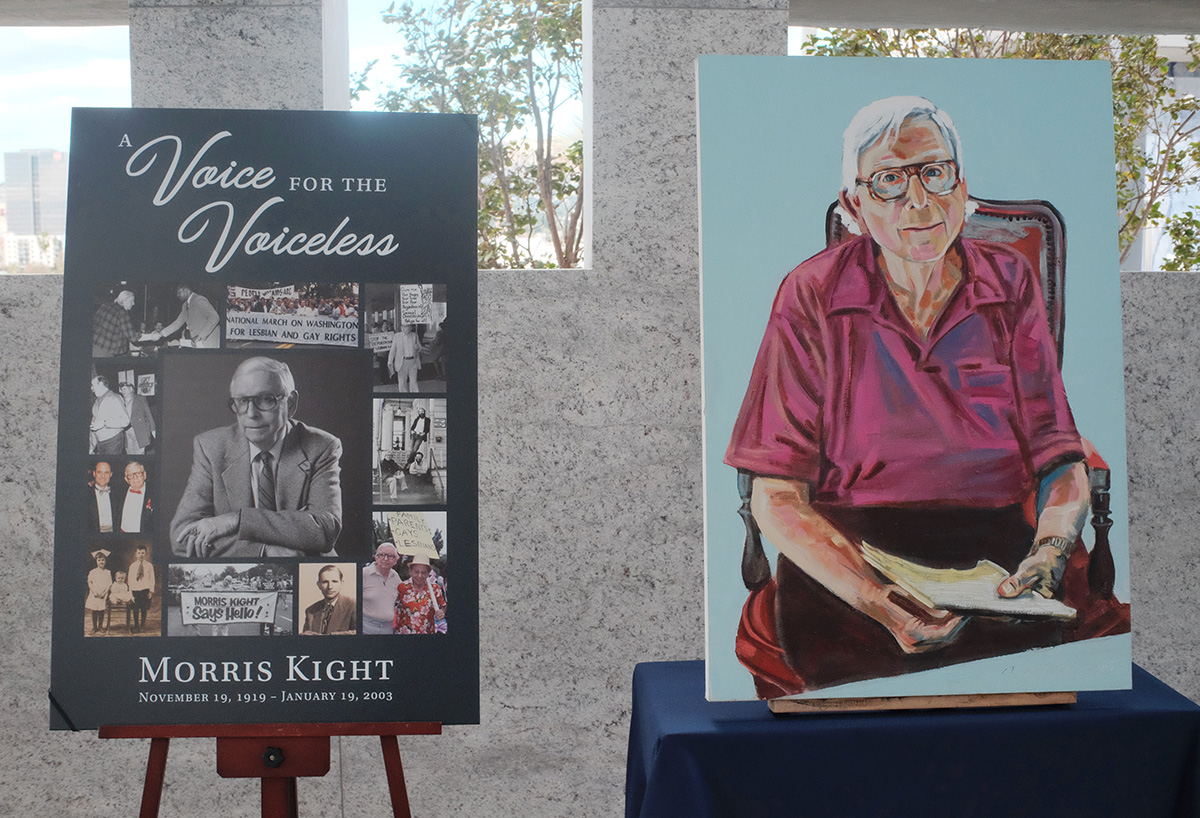
Over 50 people made their way to the rooftop chapel at Hollywood Forever Cemetery’s Gower Mausoleum on Saturday afternoon, taking in sweeping views of the city as a gentle wind began to envelop the space — a wind that some thought signaled the presence of Morris Kight. Hosted by local nonprofit AIDS Healthcare Foundation (AHF), this reception provided longtime friends, fellow activists, and anyone else impacted by Kight’s legacy with the opportunity to share some of their most memorable stories about the LGBTQ+ vanguard.
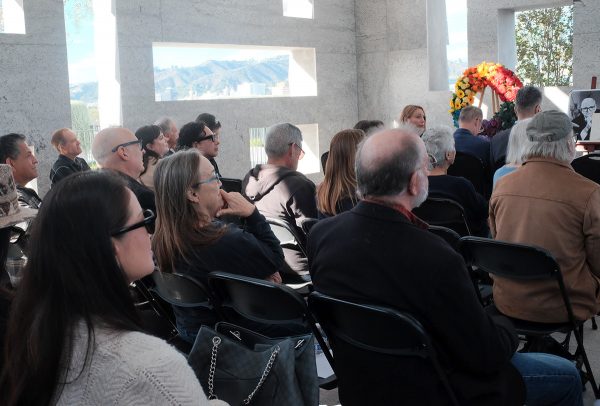
Kight died on January 19, 2003, after decades of leading peaceful, bold, and outspoken action against oppressive systems that targeted marginalized communities. As Congresswoman Maxine Waters declared at the remembrance event: “You have to be a hell of somebody to be memorialized 22 years after.”
Kight co-founded the Los Angeles LGBT Center in 1969, first known as the Gay Community Services Center, where so many queer youth and adults found the courage and empowerment to seek education, resources, and comfort. It became the place where they could fully embrace themselves.
At 19, AHF president Michael Weinstein found himself at the front steps of the Center, afraid but compelled. This is where his and Kight’s lives would intertwine, setting him on his own path of liberatory leadership. This first encounter and relationship “cemented” his identity, Weinstein told the crowd, after an arduous search for belonging and internal understanding.
The impact Kight had on Weinstein and innumerable other queer folks was not just a consequence of his work, but the purpose for it all. “We were his payment. We were his reward,” said Miki Jackson, Kight’s longtime friend and another instrumental voice in early LGBTQ+ movements. “Morris cared that we were loud enough, we were out enough, we were visible enough that a child in Kansas in elementary school would know about it. He cared about where people were wounded the most.”
Kight projected his voice in hopes it would reach those who were silenced, becoming the face of several important movements, including the Gay Liberation Front. He raised money for people with AIDS, co-founded the Stonewall Democratic Club, and pushed for L.A.’s first pride parade in 1970 — unabashedly fighting for the visibility of LGBTQ+ people as they were met with societal violence and rejection.
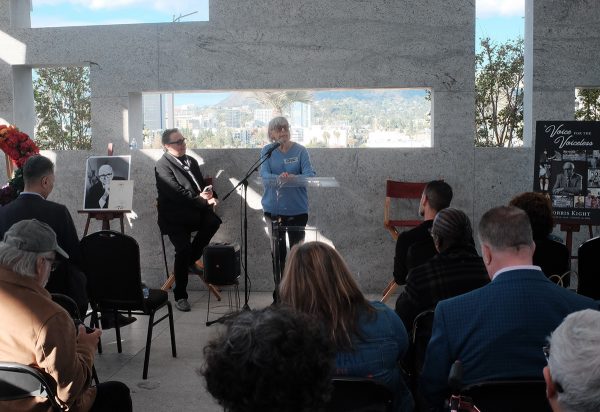
“The idea of forgetting a Morris Kight is basically impossible,” said Terry DeCrescenzo, one of the founders of the Gay Academic Union. She recounted fond memories with Kight, including a story tied with her roots of protesting. Together, they blocked the streets of Sunset and Larrabee and sang the civil rights anthem “We shall overcome.” At first, DeCrescenzo was in disbelief. “I thought, ‘I went to Catholic school for 17 years to sit on the sidewalk singing We shall overcome?’ And the answer is yes. He showed me a way of doing things — of approaching life — that I didn’t dream I was capable of. So I thank you, Morris. I love you. I miss you.”
Kight’s ashes have been officially interred at Hollywood Forever Cemetery, granting him a final resting place. In life, he built sites of belonging for queer people, and today, this ground joins a tender catalog of spaces that contains a trace of what his loved ones hope he is remembered for: the fierce kindness with which he led his life. His endless stories. His desire to be with and fight for the people he loved.
Saturday’s remembrance event also offered a moment of deep reflection for the future of local queer activism. “We’re what we have left,” said Jackson, a queer elder who marched alongside Kight in the country’s early days of LGBTQ+ protesting — and who paved a path for younger advocates like Congressman and Equality Caucus Chair Mark Takano to continue the fight. “May we honor Morris by carrying his fire forward until every LGBTQ+ person in this country can live safely, open and unafraid,” said Takano.
Kristie Song is a California Local News Fellow placed with the Los Angeles Blade. The California Local News Fellowship is a state-funded initiative to support and strengthen local news reporting. Learn more about it at fellowships.journalism.berkeley.edu/cafellows.
-

 Commentary3 days ago
Commentary3 days agoThe perfect storm: Our queer infrastructure is in crisis
-

 a&e features5 days ago
a&e features5 days ago“I should have been there”: A queer Korean adoptee finds healing with original family members
-
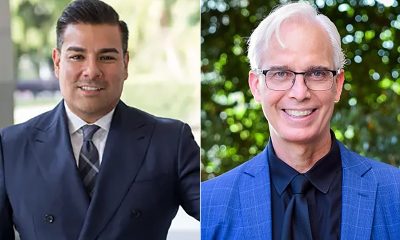
 California5 days ago
California5 days agoRicardo Lara, John Heilman inducted into Victory Institute’s Hall of Fame
-

 Television3 days ago
Television3 days ago‘Heated Rivalry’ is the gay hockey romance you didn’t know you needed
-
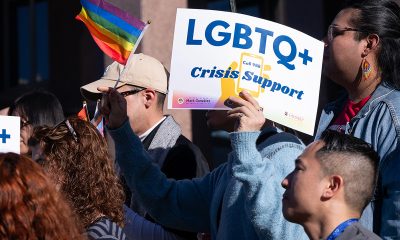
 LGBTQ+ Youth Mental Health3 days ago
LGBTQ+ Youth Mental Health3 days agoL.A. County officials advocate to reinstate “Press 3” crisis hotline for young queer people
-

 Los Angeles1 day ago
Los Angeles1 day agoRecent L.A. County report reveals record number of hate crimes against transgender and nonbinary community members
-

 Commentary2 days ago
Commentary2 days agoLove in the time of porn: a glimpse into the dating life of an adult performer
-

 Music & Concerts2 days ago
Music & Concerts2 days agoSalina EsTitties and GMCLA are primed and ready for this weekend’s ‘Holiday Legends’
-

 Books8 hours ago
Books8 hours agoThe best books to give this holiday season
-
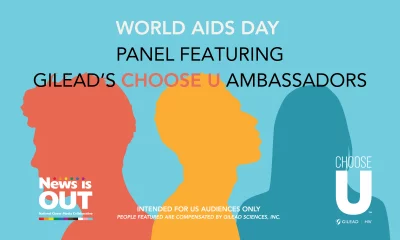
 Health16 hours ago
Health16 hours agoChoose U ambassadors share lived experiences with HIV, personal reflections, and insights



